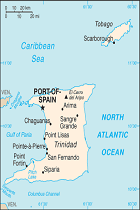
While SE Asia has been the primary focus of most piracy reports in recent months, there are other areas in which the problems still pervade. West and East Africa may have seen dips in the volume of attacks, but one hot spot which is not usually synonymous with pirates has seen a rise in number, frequency and indeed the ferociousness of attacks.
This is the Caribbean, more especially, off Trinidad and Tobago and the South American coast.
The issue of piracy along the maritime borders between Trinidad and Tobago and Venezuela has escalated to such levels this year that is has become subject to discussion amongst the island’s Cabinet officials and Venezuelan state authorities.
Maritime boundary security and the related issues of piracy have become an important diplomatic focus, and there have been ongoing efforts to revive a high- level consultative mechanism that had been established between both nation states, but which had fallen away in recent years. Part of the discussions have been on establishing regulations in relation to what happens at sea and how the nations should monitor their respective maritime borders.

Regionally the issue has perhaps been clouded by territorial disputes, with Venezuela and Guyana at odds in relation to a boundary dispute in waters off their respective coasts. Interestingly this rather enforces academic views of piracy, as territorial disputes and complexity are often seen as one of the pillars of piracy – along with economic disparity and instability.
The problem of piracy has been growing in the region of late and there have been a spate of attacks and even deaths, the most recently saw armed Spanish-speaking
pirates attack Trinidadian fishermen last month. While in July, two fishermen were kidnapped, the search for their abductors led Venezuelan authorities to kill five pirates in August. A ransom demand had been made for the two kidnapped fishermen, whose fates remain unknown.
Some experts believe it possible that a “pirate industry” has developed in Venezuela, with attackers seeking to earn income through opportunistic attacks at sea.
Though the Trinidadian authorities are trying to steer clear of expressing their concerns too vocally, they have been keen to tie attacks to just one gang, which means they can play down the idea of a new “pirate industry” springing up.
In the meantime while political efforts continue, the Trinidad Government has reportedly acquired equipment to deal with border patrols, however there is more which still needs to be done according to local observers.

Another maritime security issue which is very much a hot topic in the Caribbean region is that of “petty theft”, which is something that belies its rather misleading name, and is a precursor to more serious security issues.
One senior maritime industry commentator, and former head of security with BIMCO recently claimed that even perceived small failings of maritime security and of the International Ship and Port Facility Security (ISPS) Code can hint at much bigger problems.
While not speaking about the Caribbean issue in specific terms, Thomas Timlen, believes the industry needs to stop using the term “petty theft”.
Downplaying breaches of international maritime security measures can have globally catastrophic consequences. With an increasing number of people and organisations referring to unauthorised intrusions on board merchant ships as “petty incidents”, it seems that the concerns that lead up to the implementation of the ISPS Code may have vanished.
Naturally the word ‘petty’ is an adjective used for events or things of little importance, and this is most definitely not the case when criminals board a vessel – whatever weapons they may carry, or whatever their target. According to Timlen, thefts from vessels should not be deemed trivial - they are boardings and should be treated as such.
So with calls for a unified reporting agency, increasing levels of problems in seas such as the Caribbean, and a need for enhanced definitions, it seems that a real shake up of the maritime security landscape is necessary – but there are fears that such changes are unlikely.
The reliance on some lesser form of catch-all term is something which politicians are fond of, and so it is even more important that problems are faced and not whitewashed.
*Image credit: Wikimedia Commons; Wikimedia Commons
Article from the bridge issue 10 written by SAMI.

Post your comment
You cannot post comments until you have logged in.
Login to post a commentComments
No one has commented on this page yet.
RSS feed for comments on this page | RSS feed for all comments